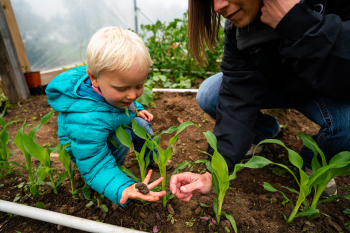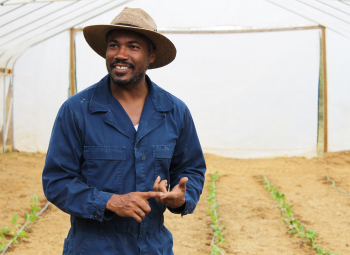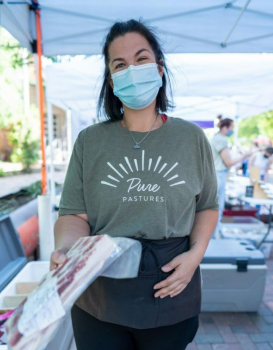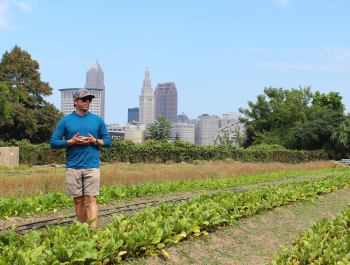Sustainable Agriculture
More than 2 million farms dot the United States, covering about 40 percent of the land in America. The National Center for Appropriate Technology’s (NCAT) trusted sustainable agriculture work supports farmers, ranchers, agriculture educators, and land managers at every stage of their agricultural journey.
From the basics of starting a farm to marketing locally grown products, and from organic specialty crop production to regenerative livestock management, NCAT’s sustainable agriculture specialists provide trusted, practical multimedia resources to nearly 35,000 farmers each year. In fact, NCAT’s ATTRA Sustainable Agriculture website is accessed nearly 3.3 million times each year.
Meet the full Sustainable Agriculture team, here.
Learn more about some of NCAT’s key sustainable agriculture projects.
ATTRA Sustainable Agriculture
Central to NCAT’s sustainable agriculture work is the ATTRA Sustainable Agriculture program, created in 1987 through a cooperative agreement with the U.S. Department of Agriculture Rural Development program.
ATTRA is a trusted source of sustainable agriculture information and maintains a knowledgebase of practical multimedia resources for farmers, ranchers, and educators. NCAT’s agriculture specialists work directly with farmers, ranchers, land managers and others across the country to provide individualized technical assistance, practical learning opportunities, and facilitates meaningful connections among producers, experts, researchers, and industry professionals.
Armed to Farm
Armed to Farm is a sustainable agriculture training program for military veterans. NCAT arranged the first Armed to Farm training through a Beginning Farmer and Rancher Development Project with the University of Arkansas. The program has expanded with support from a cooperative agreement with USDA-Rural Development.
Since 2013, Armed to Farm has supported more than 800 veterans from 45 states with hands-on and classroom learning opportunities. Farmer veterans learn how to make a business plan, market their products, how to access USDA and other funding programs, set business goals, and develop mentorships with seasoned farmers.
Soil for Water
Soil for Water supports an expanding network of farmers and ranchers who are taking steps to catch and hold more water in the soil. The Soil for Water project grew out of the western megadrought, which is putting a strain on agricultural producers across the country.
The free and voluntary program combines the use of appropriate technology, peer-to-peer learning, and adaptive management to encourage the adoption of regenerative agricultural practices. The Soil for Water project is about building lasting infrastructure and connecting dynamic agricultural producers that will make farms, ranches, and communities more resilient in the face of persistent drought and other natural disasters.
AgriSolar Clearinghouse
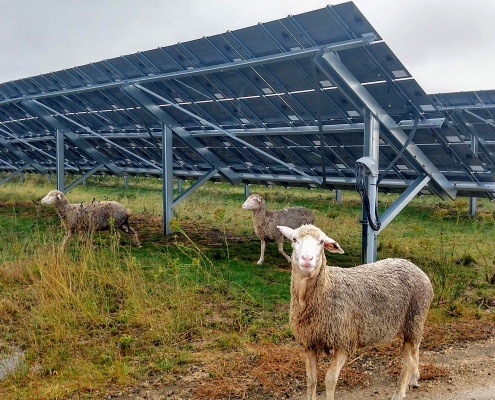 The AgriSolar Clearinghouse is a nationwide hub developed by NCAT to connect businesses, landowners, and researchers with trusted resources to support the growth of co-located solar and sustainable agriculture, also known as agrivoltaic development. By 2030, solar installations are expected to cover more than 3 million acres of land in the United States. Today, most of those installations sit on top of stripped, single-use land. Expanding agrivoltaics on solar-appropriate lands will allow agricultural and solar producers to maximize the use of land, increasing pollinator habitat, diversifying ecosystem services, and increasing revenue. AGRISOLARCLEARINGHOUSE.ORG.
The AgriSolar Clearinghouse is a nationwide hub developed by NCAT to connect businesses, landowners, and researchers with trusted resources to support the growth of co-located solar and sustainable agriculture, also known as agrivoltaic development. By 2030, solar installations are expected to cover more than 3 million acres of land in the United States. Today, most of those installations sit on top of stripped, single-use land. Expanding agrivoltaics on solar-appropriate lands will allow agricultural and solar producers to maximize the use of land, increasing pollinator habitat, diversifying ecosystem services, and increasing revenue. AGRISOLARCLEARINGHOUSE.ORG.
Latino Farmer Conference
The Latino Farmer Conference is a yearly event that seeks to build networks and provide learning opportunities for farmers on a range of technical and social issues relating to sustainable agriculture. The free conference aims to provide trusted, practical, and culturally relevant information. Each session is created based on farmer feedback, and all content is presented in Spanish. NCAT’s Latino Farmer Conference is a partnership with the Natural Resources Conservation Service. ATTRA.NCAT.ORG/LATINOFARMERCONFERENCE.
Grow Montana
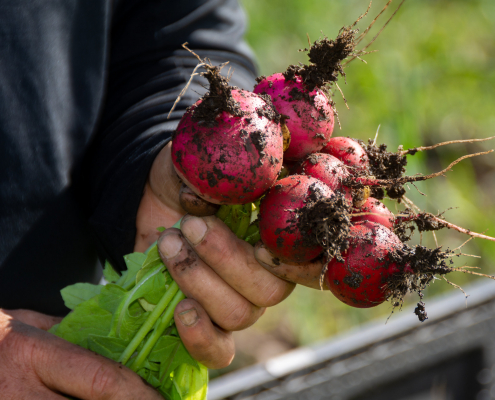 Grow Montana is a broad-based food policy coalition whose common purpose is to promote sustainable Montana-owned food production, processing, and distribution and improve all citizens’ access to healthy Montana foods. GROWMT.ORG.
Grow Montana is a broad-based food policy coalition whose common purpose is to promote sustainable Montana-owned food production, processing, and distribution and improve all citizens’ access to healthy Montana foods. GROWMT.ORG.
SIFT Demonstration Farm
NCAT’s SIFT – or Small-Scale Intensive Farm Training program – aims to help communities increase their food security by producing their own healthy food. NCAT’s SIFT is a working, sustainably managed demonstration farm on five acres at our Butte, Montana, headquarters. This farm is the center of a program that teaches farmers and future farmers, urban food producers, community leaders, and citizens how to produce high-value, nutrient-rich food on small parcels of land. And in Butte’s case, in a challenging climate. ATTRA.NCAT.ORG.
Harvest of the Month
The Montana Harvest of the Month program showcases Montana grown foods in Montana communities. Montana Harvest of the Month is open to K-12 schools, afterschool programs, Summer Food Service Programs, early care and education facilities, producers, businesses, farmers markets, foodbanks and healthcare institutions in Montana. Each month, participating sites focus on promoting one locally grown item (e.g., winter squash) by serving it in at least one meal, snack, or a la carte offering, and displaying or distributing HOM materials. Additionally, schools and early care and education settings participate by offering taste tests to students and doing educational lessons and activities. MTHARVESTOFTHEMONTH.ORG.
Mississippi Food Justice
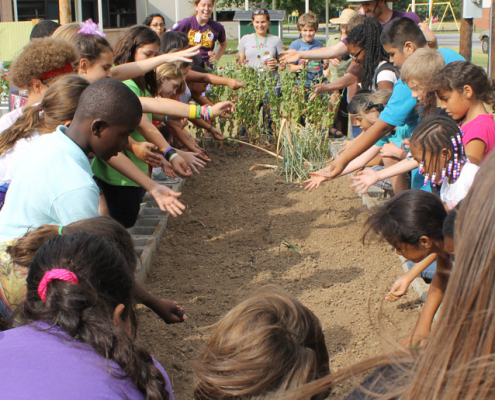 The Mississippi Food Justice Collaborative is a partnership of organizations working together to improve health outcomes for vulnerable children and their families in Mississippi and to catalyze systemic change in our food system through collaboration on multiple levels. The groups that make up the Collaborative include NCAT, FoodCorps, Mileston Cooperative Association, Mississippi Farm to School Network, and the Mississippi Band of Choctaw Indians. The project is funded by a grant from the W.K. Kellogg Foundation. MSFOODJUSTICE.NCAT.ORG.
The Mississippi Food Justice Collaborative is a partnership of organizations working together to improve health outcomes for vulnerable children and their families in Mississippi and to catalyze systemic change in our food system through collaboration on multiple levels. The groups that make up the Collaborative include NCAT, FoodCorps, Mileston Cooperative Association, Mississippi Farm to School Network, and the Mississippi Band of Choctaw Indians. The project is funded by a grant from the W.K. Kellogg Foundation. MSFOODJUSTICE.NCAT.ORG.
Preparing a Resilient Future
NCAT leads a regional partnership to help more than 300 beginning farmers and ranchers across the Northern Great Plains explore the value, viability, and resilience of raising organic field crops. NCAT will lead this $600,000 three-year Preparing a Resilient Future project alongside the Montana Organic Association, Northern Plains Sustainable Agriculture Society, Center for Rural Affairs, the Intertribal Agriculture Council, Nebraska Sustainable Agriculture Society, International Organic Inspectors Association, North Dakota State, and University of Wyoming. The Preparing a Resilient Future project is unique in that it will help beginning farmers and ranchers fully explore the economic and productive viability of organic systems in the Northern Great Plains.
Climate Smart Farming Initiative
NCAT is leading the development of the Texas Climate Smart Agriculture Alliance and seeking funding for Carbon Farm Planning demonstrations and other projects to advance climate smart agriculture that will improve climate resilience in Texas.
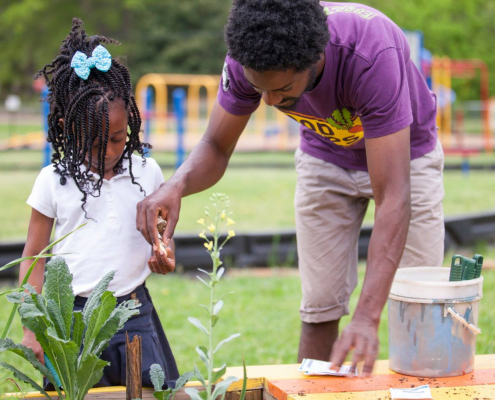 Bringing the Farm to School
Bringing the Farm to School
Bringing the Farm to School is a cooperative agreement with NCAT, the National Farm to School Network (NFSN), and the USDA Food and Nutrition Service to develop a farm-to-school training program for agricultural producers. The program goal is to give agricultural producers training and tools to build their capacity to launch or grow efforts to sell to schools. The program will be taught by state agencies and farm-to-school stakeholders and will increase sales to schools for farmers while expanding farm to school activities for students in schools and communities across the nation. FARMTOSCHOOL.ORG.
Pest Management Alliance Grant
In collaboration with the University of California, this project focuses on Hmong and Mien farmers, providing alternative ways to manage weeds and insect pests through educational farm visits and informational pieces in the appropriate language.

